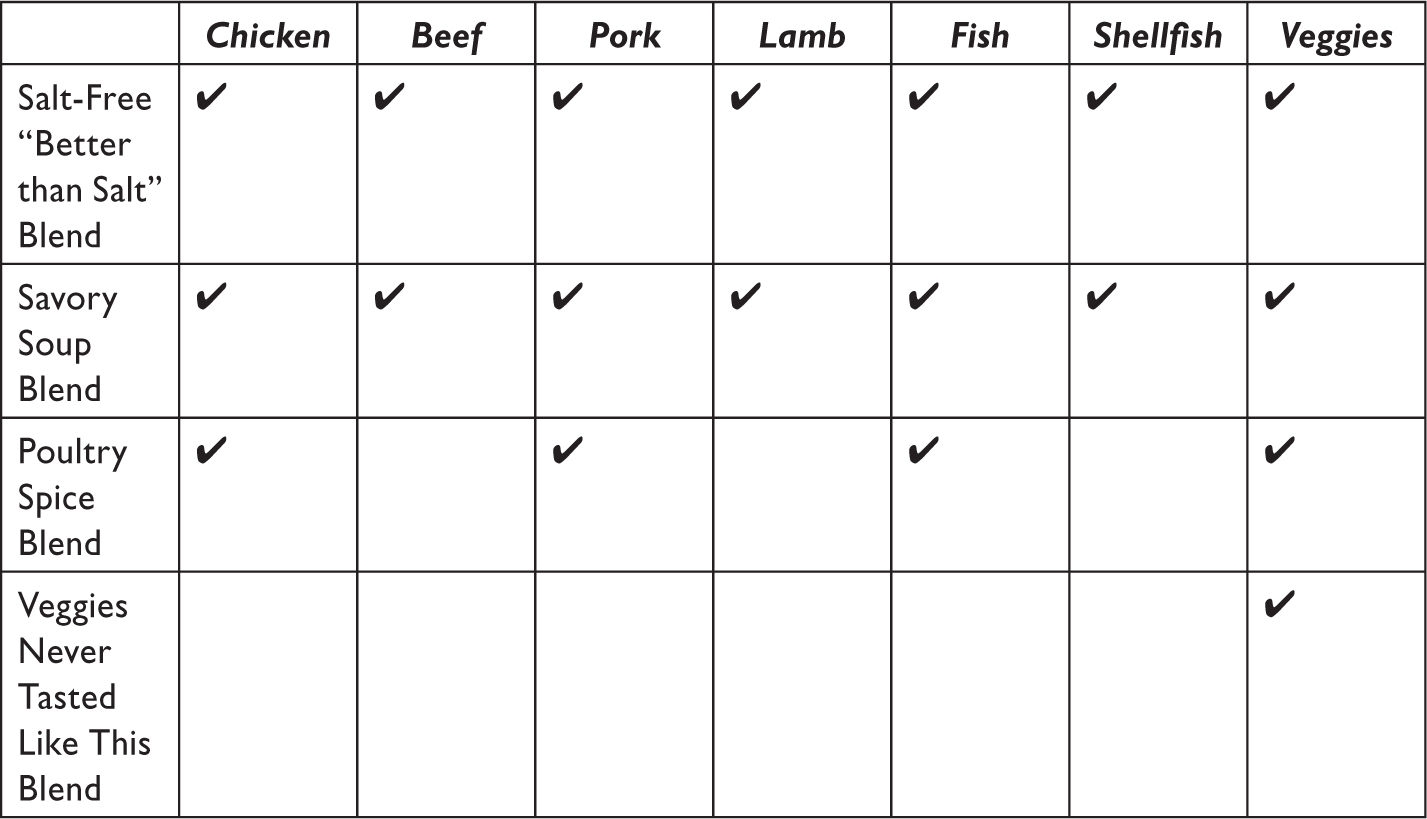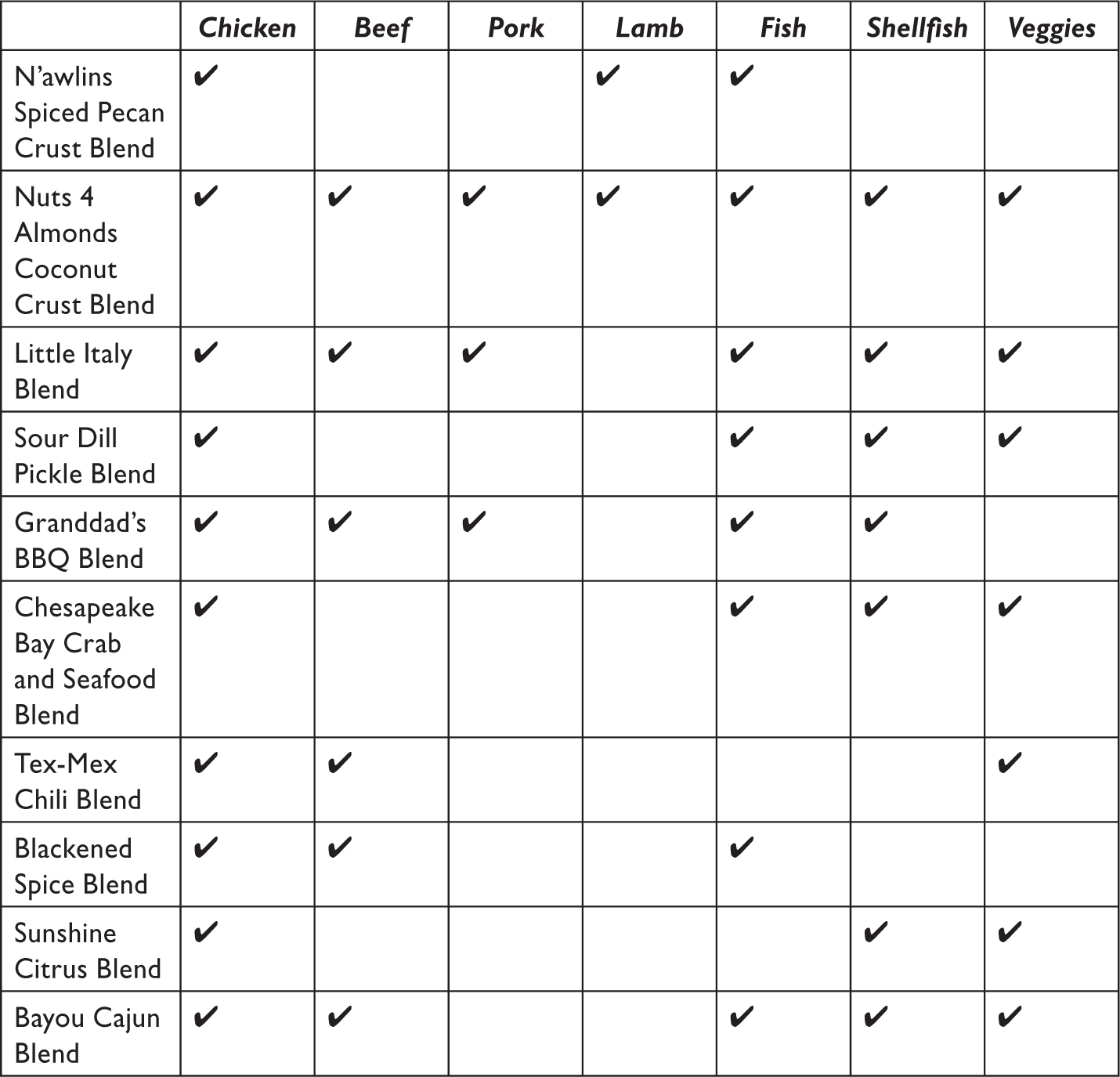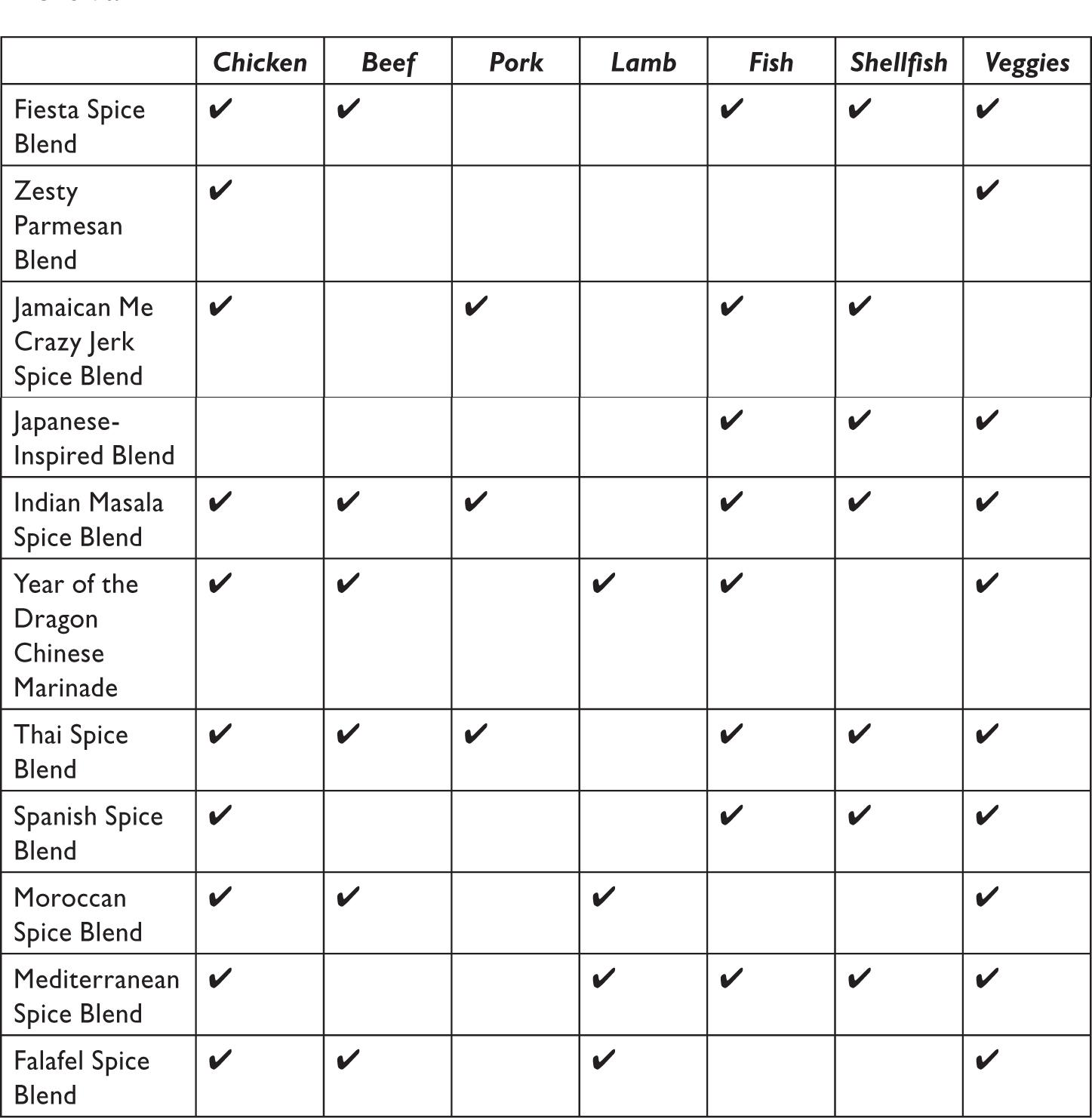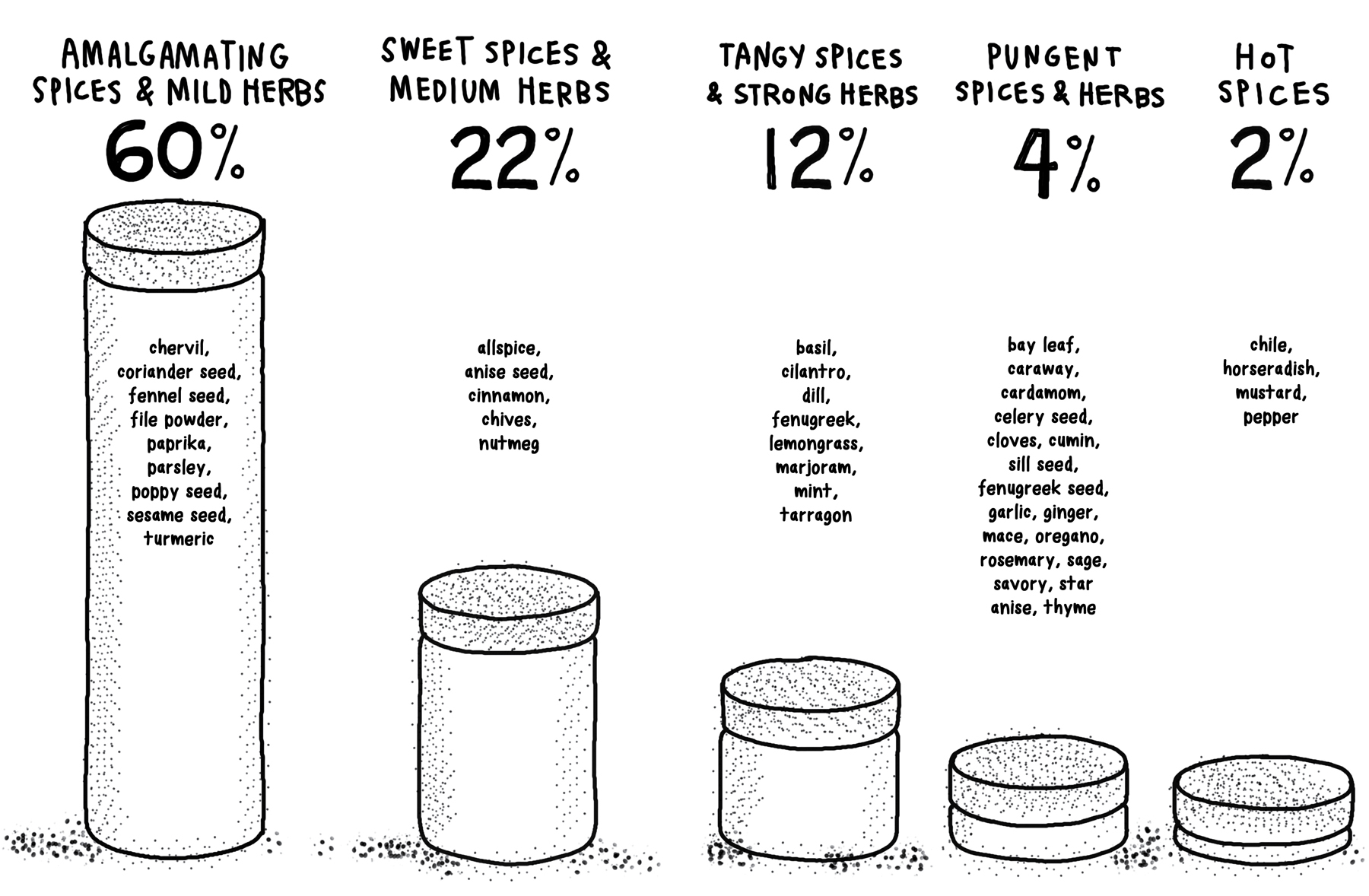FALAFEL SPICE BLEND
Yield: about 3 tablespoons
Middle Eastern food has been growing in popularity all over the country. Hummus, baba ghanoush, tabbouleh, chicken, lamb and beef shawarma, tzatziki, and lamb gyros are just a few examples of the extraordinary food from the Middle East. In some cities, Middle Eastern vendors and restaurants are on every corner. This is great party food!
2 teaspoons smoked paprika
2 teaspoons ground cumin
1 teaspoon ground black pepper
1 teaspoon ground coriander
½ teaspoon ground cinnamon
½ teaspoon ground nutmeg
¼ teaspoon ground cardamom
¼ teaspoon ground cloves

How Much to Use
For any dish that serves four to six people, use ½ teaspoon of ground spice or dried herbs. For chopped fresh herbs, use 1½ teaspoons. Since oils are concentrated in the drying process of herbs and spices, it takes about a third the quantity of dried herbs as fresh.
In general, add ground or chopped spices and herbs around the midway point or toward the end of the cooking process so their flavors stay strong.
THE SWISS ARMY KNIFE OF SPICE BLENDS
I have put together these at-a-glance charts to give you some ideas of what type of food might pair well with each blend. You can use them to mix and match flavor ideas, and of course get creative on your own with any combination you’d like to try!
Foundational

United States of Flavors

Global

SPICE COMPATIBILITY
Some spices simply do not go together. For whatever reason, their flavors don’t meld when combined, or they can actually clash. As you begin to have fun with spices in your cooking and want to create your own combinations, you might be baffled about which spices go well together. The chart that follows gives you a quick reference to what spices blend together well and what foods are compatible with a specific spice. As you gain more confidence, you will come up with different creative blends. Experiment! The possibilities are countless.
If you are feeling insecure about experimenting, think about salt and pepper. You know when you have been heavy-handed with either of these seasonings. The same is true for spices and herbs. Start with modest measurements and add spices and herbs to taste. Remember: Dried spices and powders are more intense than fresh herbs. The rule of thumb is that 1 tablespoon fresh herbs equals 1 teaspoon dried—that’s a 3:1 ratio. When you’re trying a new combination, though, start off lightly and taste your way up to the perfect flavor.
Spice: Allspice
Blends With: Cardamom, cinnamon, ginger, nutmeg
Good With: Apples, beets, cabbage, nuts, onions, pears, poultry, root vegetables, seafood
Spice: Basil
Blends With: Garlic, parsley, lemongrass, chili, oregano, rosemary, coriander, mint, thyme
Good With: Tomato, olive oil, onion, chicken, pasta, eggs, zucchini, strawberries, spinach, eggplant, leafy vegetables, mushrooms, olives, peaches, poultry, raspberries, seafood
Spice: Cayenne/chile
Blends With: Cilantro, cinnamon, cumin, basil, garlic, ginger, oregano
Good With: Bananas, beans, grains, cheese, citrus, chocolate, corn, beef, potatoes, poultry, seafood, tropical fruits
Spice: Cinnamon
Blends With: Allspice, cardamom, chiles, clove, curry, ginger, nutmeg
Good With: Apples, bananas, beans, chocolate, coffee, cranberry, dates, game meats, grains, squash, tea
Spice: Coriander
Blends With: Cilantro, cumin, mint, parsley
Good With: Bananas, beans, cured meats, curry, game meats, poultry, root vegetables, seafood, tomatoes
Spice: Cumin
Blends With: Cilantro, garlic, mint, parsley
Good With: Avocados, beans, beef, citrus, cucumber, grains, mango, onion, poultry, sausages, seafood, tomatoes
Spice: Dill
Blends With: Aniseed, caraway, chives, fennel, mint, oregano, parsley, tarragon
Good With: Beets, blue cheese, cabbage, carrots, chicken soup, cucumbers, eggs, potatoes, seafood, tomatoes, veal
Spice: Garlic
Blends With: Basil, chile, coriander, dill, ginger, marjoram, oregano, parsley, rosemary, sage, thyme, turmeric
Good With: Beans, beef, chicken, lamb, mushrooms, onions, pasta, pork, potatoes, seafood, spinach
Spice: Ginger
Blends With: Allspice, aniseed, chiles, chives, cinnamon, cloves, coriander, cumin, fennel, garlic, nutmeg, pepper
Good With: Asparagus, bananas, carrots, chocolate, citrus, coconut, cranberry, curry, dates, onions, pears, poultry, raisins, root vegetables, seafood, tea, tropical fruits
Blends With: Allspice, cinnamon, clove, cumin, ginger
Good With: Asparagus, blue cheese, cabbage, carrots, cheese, cranberries, coffee, eggs, green beans, pasta, peaches, pumpkin, potato
Spice: Oregano
Blends With: Basil, cinnamon, cumin, fennel, garlic, parsley, thyme
Good With: Artichokes, beans, beef, blue cheese, eggplant, mushrooms, nuts, pasta, poultry, seafood, squash, tomatoes, veal
Spice: Paprika
Blends With: Allspice, basil, caraway, cardamom, chile, cinnamon, cloves, coriander, cumin, fennel, garlic, ginger, oregano, parsley, rosemary, sage, thyme, turmeric
Good With: Veal, pork, chicken, beef, eggs, sauces
Spice: Parsley
Blends With: Basil, bay leaf, chervil, chives, dill, garlic, oregano, rosemary, thyme
Good With: Artichokes, asparagus, beets, beef, game meats, grains, mushrooms, onions, pasta, potatoes, poultry, sea food, tomatoes
Spice: Rosemary
Blends With: Basil, garlic, fennel, oregano, parsley, sage, thyme
Good With: Apples, asparagus, beans, beef, blue cheese, citrus, cranberry, game meats, grains, mushrooms, nuts, onion, potatoes, poultry, seafood, tomatoes
Spice: Sage
Blends With: Garlic, parsley, rosemary, thyme
Good With: Anchovy, capers, cranberry, beef, game meats, green beans, mushrooms, nuts, pasta, plums, poultry, seafood, veal
Spice: Thyme
Blends With: Basil, bay leaf, chervil, dill, mint, oregano, parsley, sage
Good With: Artichoke, bananas, beans, carrots, citrus, cranberry, dates, mushrooms, nuts, onion, potatoes, poultry, seafood, tomatoes
Spice: Turmeric
Blends With: Allspice, cardamom, chile, fennel, garlic, ginger, lemongrass, paprika, parsley
Good With: Chicken, vegetables, seafood, curries, tagines, soup, roasted vegetables, leafy greens
LET’S LOOK AT IT ANOTHER WAY: PAIRING VEGETABLES AND FRUIT WITH HERBS
Sometimes, you can look at a head of broccoli or some green beans that you are planning to steam and just not know what spices and herbs to use to layer on the flavor. The lists that follow will give you the information you need to make pairing spices and herbs with vegetables a snap. I have listed the information by vegetable. I want to make it as easy as possible for you to enhance the flavor of vegetables and fruits, because one of your primary aims in changing the way you eat is to increase your consumption of plant foods. You will be surprised at some of the fruit pairings. You may think that there is nothing as good as fresh berries or peaches, but wait until you try them with fresh basil or mint. Delicious!
Vegetables
Artichokes: bay leaf, parsley, oregano, red pepper flakes, thyme
Asparagus: chervil, chives, curry, dill, garlic, lemon, mustard, onion, sesame seeds, tarragon
Beets: allspice, basil, caraway, coriander, dill, fennel seeds, ginger, horseradish, mint, star anise, tarragon
Broccoli: caraway, curry, dill, ginger, mint, oregano, red pepper flakes, savory, turmeric
Brussels sprouts: basil, caraway, dill, parsley, nutmeg, paprika
Cabbage: caraway seeds, celery seeds, coriander, curry, dill, fennel seeds, ginger, mint, savory, tarragon, thyme
Carrots: allspice, basil, bay leaf, caraway seeds, chervil, cinnamon, cloves, coriander, fennel greens, ginger, mace, mint, parsley, sage, star anise, tarragon, thyme
Cauliflower: basil, caraway seeds, chives, coriander, curry, dill, fennel seeds, paprika, sage, thyme, turmeric
Celery: basil, chervil, curry, dill, paprika, parsley
Corn: basil, chives, cilantro, dill seeds, oregano, parsley, rosemary, thyme
Cucumber: allspice, basil, coriander, dill, mint, mustard, parsley, tarragon
Eggplant: basil, cumin, curry, marjoram, oregano, parsley, red pepper flakes, rosemary, savory, thyme
Fennel bulb: basil, caraway seeds, coriander, nutmeg, parsley, paprika, rosemary, thyme
Green beans: basil, chives, dill, onion, oregano, rosemary, savory
Kale: allspice, caraway, chile, coriander, dill, marjoram, mustard, nutmeg, tarragon, thyme
Leeks: caraway, dill, mustard, paprika, nutmeg
Lettuce: neutral, can be mixed with any spice or herb
Mushrooms: marjoram, nutmeg, parsley, oregano, sage, tarragon, and thyme
Onions: aniseed, basil, bay leaf, caraway seeds, cloves, curry, mustard seeds, nutmeg, oregano, paprika, parsley, thyme
Peas: chervil, chives, curry, dill, mint, nutmeg, parsley, rosemary, tarragon, thyme, turmeric
Peppers: basil, curry, ginger, mustard, oregano, paprika, parsley, rosemary, thyme
Potatoes: caraway seeds, chervil, chives, dill, dill seeds, mace, marjoram, paprika, parsley, rosemary, sage, thyme, turmeric
Pumpkin: celery leaves, chives, curry, ginger, onions, sage, thyme
Radishes: basil, chives, dill, mint, parsley
Red cabbage: basil, bay leaf, caraway, cloves, ginger, nutmeg, onions, thyme
Spinach: allspice, basil, chives, dill, nutmeg, sesame seeds, thyme
Squash, summer: basil, chives, coriander, dill, marjoram, onions, oregano
Squash, winter: celery leaves, coriander, mace, marjoram, onions, parsley, sage
Sweet potatoes: allspice, cardamom, chile, cinnamon, cloves, ginger, nutmeg, sage, thyme
Swiss Chard: allspice, marjoram, nutmeg, paprika, parsley, savory
Tomatoes: allspice, basil, cilantro, cumin, curry, dill, fennel seeds, garlic, oregano, parsley, paprika, red pepper flakes, rosemary, tarragon, thyme
Fruit
Apricots: cardamom, dill, ginger, lime zest, vanilla
Apples: cardamom, cilantro, cinnamon, cloves, ginger, mint, nutmeg
Bananas: cardamom, cilantro, cinnamon, cloves, coriander, ginger, parsley, thyme
Berries: aniseed, basil, cardamom, cinnamon, cloves, coriander, ginger, mace, mint, nutmeg, pepper, star anise
Blackberries: cinnamon, ginger, mint, pink peppercorns
Blueberries: ginger, lemon grass, lemon zest, lime zest, orange zest
Cantaloupe: basil, cilantro, cinnamon, ginger, lemongrass, mint, nutmeg, pepper, vanilla
Cherries: basil, mint, lemon zest, orange zest, thyme, vanilla
Dates: cinnamon, ginger, orange zest, vanilla
Figs: aniseeed, cardamom, fennel seed, ginger, mace, mint, rosemary, thyme
Grapes: basil, cardamom, cinnamon, cloves, garlic powder, ground ginger, mint, nutmeg, parsley, rosemary, star anise, thyme, vanilla
Grapefruit: basil, cardamom, cinnamon, cloves, fresh ginger, mint, nutmeg, parsley, rosemary, tarragon
Guava: basil, ginger, mint, poppy seed
Honeydew melon: cilantro, mint, thyme
Lemon: black pepper, cinnamon, cumin, dill, ginger, red pepper flakes, vanilla
Lime: basil, cilantro, lemongrass
Mangoes: cayenne, chili powder, cilantro, peppermint
Oranges: cardamom, fennel seed, mint, thyme
Peaches: basil, cloves, mint, nutmeg, thyme
Pears: bay leaf, cardamom, cilantro, cinnamon, mint, pepper, star anise, thyme
Pineapple: cloves, ginger, lemongrass, mint, rosemary
Plums: basil, cinnamon, cloves, nutmeg, star anise
Pumpkin: allspice, black sesame seeds, cardamom, cinnamon, clove, ginger, nutmeg, sage, thyme, vanilla, honey
Raspberries: chive, cinnamon, mint, pink peppercorn, star anise
Rhubarb: cinnamon, ginger, pepper, vanilla
Strawberries: allspice, basil, balsamic vinegar, cocoa powder, mint, nutmeg
Summer melons: cilantro, mint, parsley, thyme
CREATING YOUR OWN SPICE BLENDS
The twenty-five spice blends in this chapter cover a lot of flavor territory. As you get more experienced and identify the flavors you like the most, you might want to tweak the spice blends I have provided by changing the proportion of the ingredients. After a time, you might want to craft your own blends to produce unique tastes and aromas that appeal to you. As your taste buds become more sensitized, you will appreciate the subtle flavors contributing to the blend.
Balance is the key to making a spice blend that works. In chapter 2, you learned about how spices are categorized: sweet, pungent, tangy, hot, and amalgamating. Here are some guidelines:
 Sweet spices can balance the flavor of more powerful spices.
Sweet spices can balance the flavor of more powerful spices.
 Since pungent spices are strong, you have to use them sparingly.
Since pungent spices are strong, you have to use them sparingly.
 Tangy spices are astringent and add another important dimension.
Tangy spices are astringent and add another important dimension.
 Use hot spices in very small amounts.
Use hot spices in very small amounts.
 Amalgamating spices tie other spices together.
Amalgamating spices tie other spices together.
 If you need to make a correction, sweet paprika is an amalgamating spice you can use to bring the blend back into balance.
If you need to make a correction, sweet paprika is an amalgamating spice you can use to bring the blend back into balance.
The Spice and Herb Bible, which is a valuable resource, gives approximate proportions of the types of spices in a blend. As you create a blend, remember that you want to satisfy all your taste buds so that you hit that bliss point. A balanced blend of dried ingredients should contain:
 2 percent hot spices
2 percent hot spices
 4 percent pungent spices/herbs
4 percent pungent spices/herbs
 12 percent tangy spices/strong herbs
12 percent tangy spices/strong herbs
 22 percent sweet spices/medium herbs
22 percent sweet spices/medium herbs
 60 percent amalgamating spices/mild herbs
60 percent amalgamating spices/mild herbs
Hot Spices (2 percent): chile, horseradish, mustard, pepper
Pungent Spices and Herbs (4 percent): bay leaf, caraway, cardamom, celery seed, cloves, cumin, dill seed, fenugreek seed, garlic, ginger, mace, oregano, rosemary, sage, savory, star anise, thyme
Tangy Spices and Strong Herbs (12 percent): basil, cilantro, dill, fenugreek, lemongrass, marjoram, mint, tarragon
Sweet Spices and Medium Herbs (22 percent): allspice, aniseed, cinnamon, chives, nutmeg
Amalgamating Spices and Mild Herbs (60 percent): chervil, coriander seed, fennel seed, filé powder, paprika, parsley, poppy seed, sesame seed, turmeric
